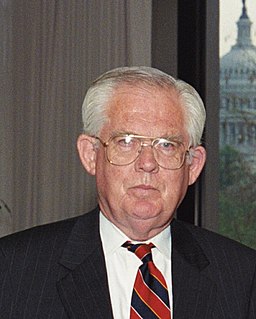A Quote by Mahatma Gandhi
The nation's non-co-operation is an invitation to the Government to co-operate with it on its own terms, as is every nation's right and every good government's duty.
Related Quotes
The right of a nation to determine its own form of government does not include the right to establish a slave society (that is, to legalize the enslavement of some men by others). There is no such thing as "the right to enslave." A nation can do it, just as a man can become a criminal- but neither can do it by right.
Nationality is not a universal human principle but an historical, local fact...Every nation, even a small one, has its own character, its own particular way of life and manner of speaking, feeling, thinking, and behaving. These distinctive features are the essence of nationality, the product of a nation's entire history and conditions of existence. Every nation, like every individual, is of necessity what it is, and has an unquestionable right to be itself. So-called national rights consist precisely of this.
Our government has become too responsive to trivial or ephemeral concerns, often at the expense of more important concerns or an erosion of our liberty, and it has made policy priorities more dependent on where TV journalists happen to point their cameras. . . . As a nation we have lost our sense of tragedy, a recognition that bad things happen to good people. A nation that expects the government to prevent churches from burning, to control the price of bread or gasoline, to secure every job, and to find some villain for every dramatic accident, risks an even larger loss of life and liberty.
What we would be committed to would be a representative government where all the Iraqi people decide who should lead their nation, and lead it in a way that keeps it together as a single nation and where all parts of the nation - Shia, Sunni and Kurds - are able to live free and in peace and believe that their interests are represented by the government.
Dictatorship nations are outlaws. Any free nation had the right to invade Nazi Germany and, today, has the right to invade Soviet Russia, Cuba, or any other slave pen. Whether a free nation chooses to do so or not is a matter of its own self-interest, not of respect for the nonexistent 'rights' of gang rulers. It is not a free nation's duty to liberate other nations at the price of self-sacrifice, but a free nation has the right to do it, when and if it so chooses.
It is for the good of nations, and not for the emolument or aggrandizement of particular individuals, that government ought to be established, and that mankind are at the expense of supporting it. The defects of every government and constitution both as to principle and form, must, on a parity of reasoning, be as open to discussion as the defects of a law, and it is a duty which every man owes to society to point them out.
Conservatives believe government's principal functions are the preservation of freedom and removal of restraints on the individual. Liberalism's ascent in the first two-thirds of this century reflected the new belief that government should also confer capacities on individuals. Liberalism's decline in the final third of this century has reflected doubts about whether government can be good at that, or whether government that is good at that is good for the nation's character.








































